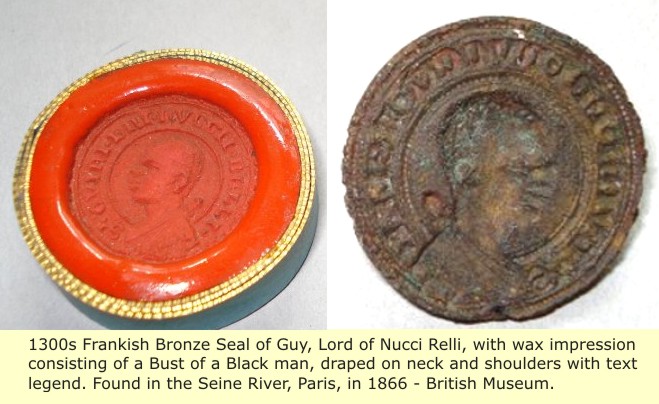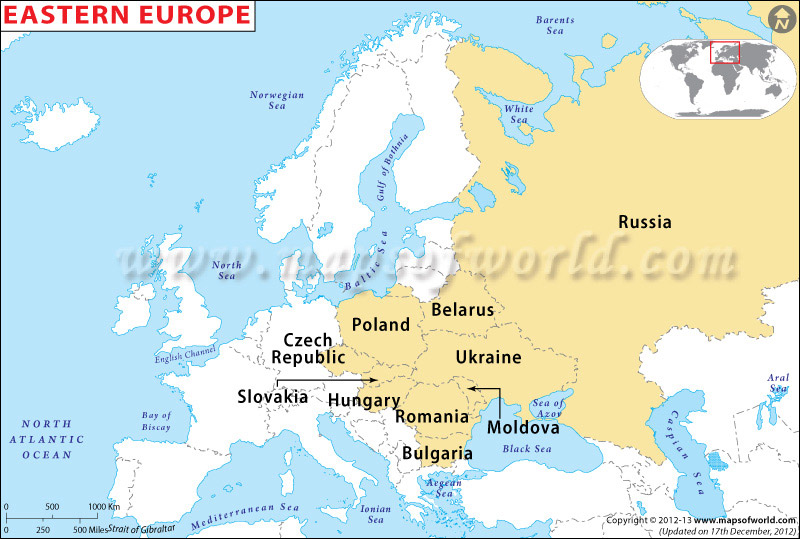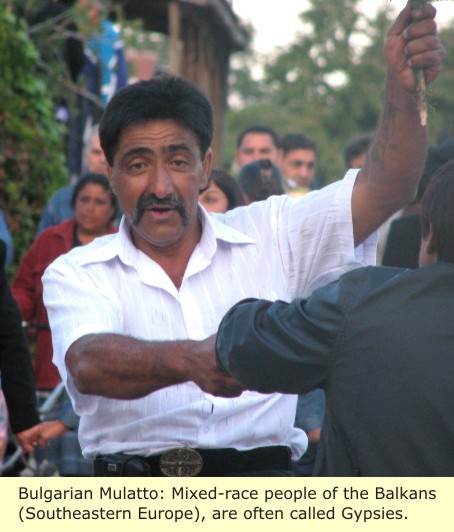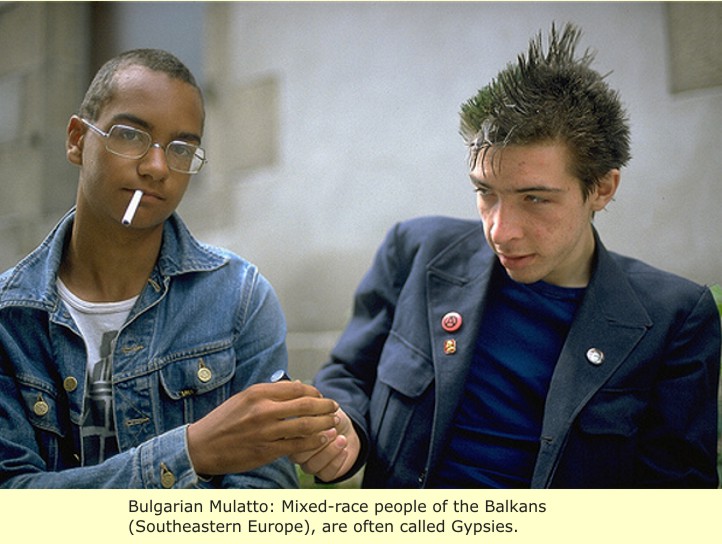Black African Nobility Of Ancient Europe - Culture (11) - Nairaland
Nairaland Forum / Nairaland / General / Culture / Black African Nobility Of Ancient Europe (219597 Views)
Seven Interesting Facts About The Ancient Yoruba Culture / When Black Men Ruled Europe: The Moors Of Spain / Deadliest Black/African Warriors!!!! (2) (3) (4)
(1) (2) (3) ... (8) (9) (10) (11) (12) (13) (14) (Reply) (Go Down)
| Re: Black African Nobility Of Ancient Europe by DeadNegroids: 11:10pm On Apr 15, 2016 |
@Jantavanta There you go putting words into my mouth. Where in any of my comments did I say Stormfront was a more credible site? You live in the "WeWuzKangz" fantasy world where every prominent figure was black. You're a jobless black revisionist whom trolls sites by claiming everything historical as yours. What's even more sad is that you've been doing this for years now. It's amazing how you people claim that you were enslaved by the evil white man for 400 years and also claim to be in power at the same time. I love how you post a dark haired German as some type of example. Most whites have dark brown hair and brown eyes so I don't see what your point is. I have dark eyes and dark hair that doesn't magically make someone black. |
| Re: Black African Nobility Of Ancient Europe by DeadNegroids: 6:09am On Apr 17, 2016 |
I can see this happening already. #WeWuzKangz #WeWuzEverythangz 1 Like
|
| Re: Black African Nobility Of Ancient Europe by 42tribes: 1:58am On May 10, 2016 |
^^fake picture by a racist troll Ancient Greece https://pbs.twimg.com/media/Ch0-bayUkAEjfk-.jpg Egypt https://pbs.twimg.com/media/Ch9DBO1UUAI4eyW.jpg 2 Likes 1 Share
|
| Re: Black African Nobility Of Ancient Europe by 42tribes: 1:03am On May 11, 2016 |
albino trash be like Moors werent black. The Spanish are pretending to be nonblack black people with dark skin and fros.  2 Likes 1 Share |
| Re: Black African Nobility Of Ancient Europe by jantavanta(m): 8:43pm On Jun 23, 2016 |
Arrival of Portuguese in Japan http://medievalpoc.tumblr.com/post/146317616056/medievalpoc-kanō-naizen-namban-screen-arrival 1 Share
|
| Re: Black African Nobility Of Ancient Europe by Kexorcist(m): 6:10am On Jun 25, 2016 |
 A cattle ranch produces less bull excrement than this thread. PhysicsQED: Top lel! This is the world's oldest photograph.  It was taken in 1826 King George III had already been dead for more than five years by then! So we have two theories of history. The first is that until 200 years ago, EVERYTHING was black and run by black African people who suddenly all fell and got supplanted by hyper racist white people who not only rewrote ALL of history, but also edited ALL the old manuscripts, prints, paintings, and statues to turn them into white people and they forced EVERYONE, including themselves to forget about the whole thing. To not offend OP by posting a reaction image of humans of the wrong skin color, I have decided to instead use technicolor cartoon ponies to illustrate my reaction.  |
| Re: Black African Nobility Of Ancient Europe by jantavanta(m): 8:00pm On Jul 16, 2016 |
Hugues de Payens – The First Grand Master of the Knights Templar Little is actually known of de Payens youth other than that he was a knight from the area of Champagne in Burgundy (in present-day France)  http://blog.templarhistory.com/2010/03/hugues-de-payens-the-first-grand-master/ http://pin.it/c2YtZW7 1 Like |
| Re: Black African Nobility Of Ancient Europe by jantavanta(m): 12:34am On Sep 01, 2016 |
Here is more evidence of the Black History of the Franks, after whom France is named. The names Francis, Franklin, Francesca, Francisco, Frankfurt are derivatives of the Franks. This 1300s Frankish bronze coin has the obvious image of Black man. Such coins carry only the image of Rulers/Kings  1 Like |
| Re: Black African Nobility Of Ancient Europe by Nobody: 8:13am On Sep 03, 2016 |
Why didnt blacks fight back if they were superior.? RUBBISH. 1 Like 1 Share |
| Re: Black African Nobility Of Ancient Europe by jantavanta(m): 2:53pm On Sep 10, 2016 |
Heraldic Panel of Wilhelm von Weitingen, 1518. Made in Sulz am Neckar, Swabia, Germany. The Metropolitan Museum of Art, New York. The Cloisters Collection, 1930 (30.113.6)  http://pin.it/8OUUUMD 1 Like 1 Share |
| Re: Black African Nobility Of Ancient Europe by jantavanta(m): 4:05pm On Sep 26, 2016 |
Blackamoor Jewelry These are european artworks of Black People http://www.ebay.com/bhp/blackamoor-jewelry  Here are more renissance medals of Black Royalty. Observe the backward slant, bulging foreheads or flaring nostrils. http://jeannedepompadour..com.ng/2012/11/renaissance-medalsmedallions-and-bas.html 1 Like |
| Re: Black African Nobility Of Ancient Europe by jantavanta(m): 10:26am On Oct 16, 2016 |
On the matter of credibility: On first reading, readers of these pages generally feel amazement, the concept of Blacks being the original settlers, and builders of the first civilizations everywhere, including Europe, is particularly unsettling to them. Both Black and White, because they were taught that there were no Blacks in Europe until the Romans brought them. Then some Blacks correctly say: Uh huh, I knew the Whites were lying, and then go on to enjoy their edification. But Whites remain incredulous, they say: this is simply Blacks with no accomplishments, trying to steal White accomplishment and history! They say, if this was true, my Teachers and Professors would have taught it to me. So either this is lies, or the information is so new that my Teachers and Professors don't know about it yet! Well No, though it may be comforting to believe that your Teachers and Professors are of sufficient character that they would not lie to you, the facts do not support that conclusion. The fact is that European scientists had evidence, and knew from earlier that the 19th century, of the Black mans central role in settling and establishing civilization in Europe and everywhere else.  |
| Re: Black African Nobility Of Ancient Europe by blueAgent(m): 8:48am On Oct 17, 2016 |
jantavanta: This is Rubbish. typical of Black IQ. |
| Re: Black African Nobility Of Ancient Europe by blueAgent(m): 8:54am On Oct 17, 2016 |
jantavanta: I laugh at this dude.quite confused. |
| Re: Black African Nobility Of Ancient Europe by blueAgent(m): 9:09am On Oct 17, 2016 |
jantavanta: Clown, quite been funny. did blacks also inhabit Asia and China. |
| Re: Black African Nobility Of Ancient Europe by blueAgent(m): 9:14am On Oct 17, 2016 |
jantavanta: Clown, quite been funny. did blacks also inhabit Asia and China? |
| Re: Black African Nobility Of Ancient Europe by jantavanta(m): 11:03pm On Oct 19, 2016 |
blueAgent: I thought you'd like this board on Pinterest... http://pin.it/5_T6dnR It is about Black Asia....including China |
| Re: Black African Nobility Of Ancient Europe by blueAgent(m): 4:41pm On Oct 21, 2016 |
jantavanta: Pure propangander. |
| Re: Black African Nobility Of Ancient Europe by Diasoul: 10:18pm On Oct 26, 2016 |
jantavanta: I don't believe everything you posted, knowing you've been at this for almost four years is pretty damn impressive |
| Re: Black African Nobility Of Ancient Europe by jantavanta(m): 5:15pm On Oct 30, 2016 |
The Medieval English Village is an African Invention [img]http://www.beforebc.de/Made.by.Humankind/Pottery.Boats.Ruins/59-10-6-10.jpg[/img] |
| Re: Black African Nobility Of Ancient Europe by jantavanta(m): 4:03pm On Feb 13, 2017 |
William I Prince of Orange (in Netherlands) The Netherlands were sending expeditions to the Americas, and New York was previously called New Netherlands. The Rulers of Netherlands were Black and the Inhabitants of New Netherlands were Black Indians or Black Native Americans https://www.nairaland.com/3522334/africans-first-people-ancient-americas [img]http://www.beforebc.de/all_europe/0a.William.I.Prince.of.Orange.1533.jpg[/img] http://www.beforebc.de/all_europe/02-16-800-00-51.html |
| Re: Black African Nobility Of Ancient Europe by jantavanta(m): 8:19am On Feb 14, 2017 |
"Was Herodotus, the Father of History, African? [img]http://www.beforebc.de/all_europe/700_mediterranean/02-16-400-20.jpg[/img] In writing the nine volume work, Histories, Herodotus earned himself the title of the “Father of History.” His was the first “true” history though he took the same liberties most historians today do when writing to please themselves not always truth. Was Herodotus African or white? And why is it necessary to determine his ethnicity, however? Because the honor is great and every great ancient figure has been presented as both African [D1, 8, 7, 6] and white [D2, 3, 4, 5]. By “African” I mean those with some combination (so not necessarily all) of wooly hair [B13, C26, D7], a full nose [A3, B14, D1] and full mouth [A5, B11, C19, D7]. As the accomplishments of whites and Asians worldwide are acknowledged based on appearances alone, so too will the identity of the Father of History be made on appearance alone - African or white. In 484 BC, Herodotus was born in the city of Halicarnassus [ A ] in the nation-state of Caria. Both his father and uncle had Carian names with the significance being that Carians were an indigenous population settled by Phoenicians who are the same as Canaanites. [B10-14] shows that Canaanites were found in Syria, Phoenicia, Carthage [also D7] and Spain. As they [B10-14] are African, Herodotus must have been. Neighboring lands from Siberia [A1, 2] and the Ukraine [A3, 4, 5] were African heightening the fact his land was. And James Mellaart noted the ancient African population in nearby Konya [A6] indicated by the dolichocephalic skull ... just as found in prehistoric Caria itself [A7] and in Syria [A8] and Jericho [A9]. The population of the surrounding Anatolia (i.e. Turkey) was African [C15-20] as were the people in Herodotus’ birthtown itself [C21-27]. Whites from the Steppes did not begin to slowly enter southern lands until after 3800 BC [D-map] and as Herodotus was indigenous in any event, it is not likely that [D5] is Herodotus but the African [D6-like]. Finally, his uncle Panyassis was the last Carian writer of history - though like Homer’s of the epic style. In writing of his kin in Peloponnesia, he [D6] was carrying on what can be found still in African oral traditions today recording the events pertaining to his people as his “African” uncle did. Paul Marc Washington" http://www.beforebc.de/all_europe/700_mediterranean/02-16-400-20.html
|
| Re: Black African Nobility Of Ancient Europe by jantavanta(m): 8:48am On Feb 14, 2017 |
BASQUE AS NIGER-CONGO By GJK Campbell-Dunn M.A. (NZ), M.A. (Camb.) Ph.D. In this account we will systematically compare Basque morphology and sounds with Niger-Congo. The evidence will demonstrate that Basque, without doubt, is a Niger-Congo language. Basque is a member of the Togo Remnant (now Left Bank New Kwa), which was once a major Group. Basque is especially close to Akpafu. The Togo R. people travelled by ship to the Canary Islands and up the coast of Spain to the Bay of Biscay where they established fishing settlements. The genetic data (Bertranpetit & Cavalli-Sforza 1991 : 55, Fig. 1, first principal component) locates Basque genetic material in a semicircular area around the Bay of Biscay, which was settled at least from the Palaeolithic Period. The Niger-Congo cognates are taken mainly from Westermann (1927) and Mukarovsky (1977). For Basque our main sources are Trask (1997), The History of Basque, and Aulestia and White (1992), Basque-English English-Basque Dictionary. Other authorities are referred to in the text as relevant. Typographical Conventions On this web page schwa is represented by the character 3, and a palato-alveolar fricative by the combination zh. Numerals Numerals are resistant to change over time and are a good indicator of language relationship. The Basque numerals contain some fossilised Niger-Congo morphology. The word "one" bat in Basque, is related to Niger-Congo Nde i-bal, Mbofon e-ba, Guang ba "one", Gurma ba "one", Gola ba and so on. (Johnston quotes forms with initial m in this word.) The final -t is a singular marker (things), as in Kebu (Westermann 1927 : 106): gobi-di "bone", e-ko-bir "bones" (with Basque -t from final -d). Fortis and lenis plosives are used grammatically in Kebu, a Togo R. language. The word "two" bi, bi-ga, bi-da in Basque relates to Bantu bili "two" (Johnston 1919 - 22 : 32), and ultimately to Niger-Congo bi "breasts", which often has an l suffix. It is more closely connected semantically with Niger-Congo bali "two" (twenty-two reflexes in Westermann). The -ga, -da are "suffixes". Root da means "finger" in Niger-Congo. Basque "three" hi-ru, hi-ru-r is similar to Etruscan ci "three", with k > h again (+suffix). This sound change h > # is regular. Niger-Congo ki > hi is from kiti (Westermann 1927 : 288) "middle" (of the hand), which may be reduplicated to titi, kiki. Compare Avatime ku-ši "middle". The r- suffix is an old plural. Compare e-ko-bir "bones" cited above, with plural -r (< -t). For the change t > r in Togo R. see Westermann (1927 : 104). We take hirur from kitu-r. Compare Akpafu i-ru "five" with Avatime o-tu, Nyangbo i-ti, Kposso e-tu "five" for the change of t to r. A phonological parallel with Akpafu in particular. Basque "four" is lau, lau-r, Niger-Congo na "four". We have a sound change n > h > # (with loss of what was once intervocalic n? after a prefix). An l occurs in Nyangbo and Ahlo, both Togo remnant languages. Compare also Temne -aŋle (Wilson), Igala ele, Ishekiri meere (Armstrong 1967 : 63). The base form is na. The same plural suffix r may occur as in "three". Basque for "five" is ba-st, bo-r-tz. This is Niger-Congo bua (> bo) "hand", and identifies "five" with the hand, since the hand has five fingers. Niger-Congo extensions of this word occur Efik bok, bak, Mossi bonko, baγado, boγo, boγo-re (with old plural suffix) Gurma boγu, Kissi boka. Bantu has voko "arm". The final -t (singular) is due to the "hand" being singular, though having five fingers. The word for "six" is sei-r, sei in Basque (as in Italian). The form seir has the old plural in -r. "Bantu" (Johnston) has sambω, sasatu, sasaba. Niger-Congo ta "hand" should be considered as the source. This root goes to sa in Tschi, Agni and is assibilated in Baga to ke-tsa. Delo has n-sia. Basque zaz-pi is "seven", Johnston's "Bantu" sambω, sambω-bali. Similar considerations apply. The za- is for ta, sa "hand". The -pi is bi "two". See Westermann (1927 : 110, 9), bi (> pi). "Seven" is 5 (hand) + 2. Basque "ten" ha-ma-r is from Niger-Congo ka "hand" + ma "end", and refers to the end of both hands [-r plural ]. "Eleven" is ha-me-ka, "ten big", hamar + ga "big". "Twelve" is ha-ma-bi, "ten + two". "Zero" or "nothing" is Basque hu-ts, from Niger-Congo ku "thing", compare French rien "nothing", from Latin rem "thing". The same word is used for "one" in Etruscan. The Basque for 1000 e-hu-n is allegedly from Gothic. The prefix e- often precedes this word. Root ku means "big" in Niger-Congo, then "big number", i.e. "ten" or "one hundred". Bowili kuwa "ten", Ewe kpi "much", Igbo okpi "big", Bulom akpil "many". Niger-Congo i > Basque u. Bantu kumi "ten". A Niger-Congo solution is to be preferred. The attachment of suffixes to the numerals is a Niger-Congo feature: bat, batzu (pl), bi-ga "two" (ga "big"  , hiru-r "three", lau-r "four", bost, bort-z "five", sei-r "six". The attached -r of hirur, laur etc. is a Niger-Congo plural (from ri), as in Etruscan. This is clear from the fact that the r is added whenever the plural suffix -ak follows: hirurak, laurak. Compare the names Aquitani, Liguri. , hiru-r "three", lau-r "four", bost, bort-z "five", sei-r "six". The attached -r of hirur, laur etc. is a Niger-Congo plural (from ri), as in Etruscan. This is clear from the fact that the r is added whenever the plural suffix -ak follows: hirurak, laurak. Compare the names Aquitani, Liguri.Niger-Congo numerals were once prefixed also, which tends to create phonological problems of identification. This applies e.g. to lau "four", often nna in Niger-Congo with an assimilated prefix, which has changed n to l. (Westermann 1927 : 104, n > l in Togo R.) and to bost "five", where the Niger-Congo once had a preceding labiovelar as in Guang o-ma-po "end". The ordinals have a suffix -ren, len < Niger-Congo na "be", "progressive" (Etruscan ordinals have -na "to be", "progressive"  , e.g. biga-ren "second". But "first" is len( en) go, with suffix -ko < -go (< Niger-Congo gwa "much" , e.g. biga-ren "second". But "first" is len( en) go, with suffix -ko < -go (< Niger-Congo gwa "much" . The re, le is an old Niger-Congo article, often le in Togo R. . The re, le is an old Niger-Congo article, often le in Togo R.Entwhistle (1962 : 25) points out the vigesimal arrangement in Basque using hogei (< kua "foot" + gi "two"  as base. Vigesimal numerals are a feature of Niger-Congo (Gur, Yoruba), due to counting on hands and feet (before shoes were in use). Celtic took its vigesimal numerals from the same source. Latin adopted vigesimal numerals from Etruscan (XX, XXIV etc.), which we have shown by comparative linguistics to be Niger-Congo. as base. Vigesimal numerals are a feature of Niger-Congo (Gur, Yoruba), due to counting on hands and feet (before shoes were in use). Celtic took its vigesimal numerals from the same source. Latin adopted vigesimal numerals from Etruscan (XX, XXIV etc.), which we have shown by comparative linguistics to be Niger-Congo.http://www.beforebc.de/all_europe/BasqueAsANiger-CongoLanguage.html http://www.beforebc.de/all_europe/05-09-000-12.html 1 Like
|
| Re: Black African Nobility Of Ancient Europe by jantavanta(m): 3:47pm On Mar 20, 2017 |
 The R1b11-Z2015 lineage is today common in the Caucasus and Volga-Uralic region while being virtually absent in Central and Western Europe (Broushaki et al.2016). Interestingly, the earliest offshoot of extant haplogroup R1b-M343 variation, the V88 subclade, which is currently most common in Fulani speaking populations in Africa (Cruciani et al. 2010) has distant relatives in Early Neolithic samples from across wide geographic area from Iberia, Germany to Samara (Fig. 7). |
| Re: Black African Nobility Of Ancient Europe by jantavanta(m): 8:45am On May 12, 2017 |
White skin did not evolve to increase Vitamin D Absorption White skin is not better for living in the Northern colder regions of Europe. [img]http://realhistoryww.com./world_history/ancient/Images_Thrace/Debunk.jpg[/img] |
| Re: Black African Nobility Of Ancient Europe by jantavanta(m): 12:17pm On May 20, 2017 |
The Gypsies of Europe have a mixed heritage from the time when White People migrated into Eastern Europe from Central Asia. The United Nations Statistics Division defines Eastern Europe as: Belarus. Bulgaria. Czech Republic. Hungary. Moldova. Poland. Romania. Russia. Ukraine.  Gypsies are part indigenous Black Europeans mixed with settler White People. But you will not see this on television:   Anywhere in the World where White People settle among Black People, the indigenous Black People will be marginalised to gradual virtual/complete extinction; be it Americas, Europe or Asia. Speaking to my fellow Nigerians, our Secondary School Geography/History teachers could not teach us this, because their textbooks were written by Colonial Masters, to alter our self-perception in preparation for Neo-colonialism. If we want to re-introduce History in Schools, which History will be taught? Our Story or His Story?   |
| Re: Black African Nobility Of Ancient Europe by jantavanta(m): 1:41pm On May 30, 2017 |
Gypsies are nomadic people of Europe, who have spread from Eastern Europe to Western Europe. Some have suggested that Gypsies are from India. That was the same argument for the Native, Aboriginal or Indigenous Americans, who were called "Indians". Even Indians of India migrated out of Africa over 50,000 years ago. There was a time Africa had Black people with naturally straight hair. It is not only White people that can have straight hair. White People are a sub-race of black people. Black People can have every body characteristic that White People have. http://www.spraguephoto.com/stock-photos/04bg109-Romas-of-Karlova.%7C9830.jpg |
| Re: Black African Nobility Of Ancient Europe by jantavanta(m): 9:46am On Jun 02, 2017 |
Noble Crest of The Scottish Haliburton Clan  https://www./AYYNK1YKOdilWlG6_ku3p8AfOa5CEfd0JCJOcEx0Or-QU73symJqa18/ |
| Re: Black African Nobility Of Ancient Europe by jantavanta(m): 2:15am On Jul 01, 2017 |
Europe was originally a continent of Black People. No skin de-pigmentation from Black to White, took place in Europe. No Creator created people without colour and deliberately placed them in Europe to experience less sunlight, and develop more science and technology. |
| Re: Black African Nobility Of Ancient Europe by kikuyu1(m): 7:22pm On Jul 01, 2017 |
jantavanta: Hmmm...I heard Gypsies were Rajasthanis who fled after the Mughal invasions. Do you have more info? |
| Re: Black African Nobility Of Ancient Europe by jantavanta(m): 11:17am On Jul 02, 2017 |
kikuyu1: No, I do not have any other info. But, I do not know if their language is linked to the Rajasthani language. I am open to more info on their true origins. |
(1) (2) (3) ... (8) (9) (10) (11) (12) (13) (14) (Reply)
Common Beautiful Names From The Igbo Tribe / The Culture Lounge / American Women That Marry Nigerian Men
(Go Up)
| Sections: politics (1) business autos (1) jobs (1) career education (1) romance computers phones travel sports fashion health religion celebs tv-movies music-radio literature webmasters programming techmarket Links: (1) (2) (3) (4) (5) (6) (7) (8) (9) (10) Nairaland - Copyright © 2005 - 2024 Oluwaseun Osewa. All rights reserved. See How To Advertise. 91 |
